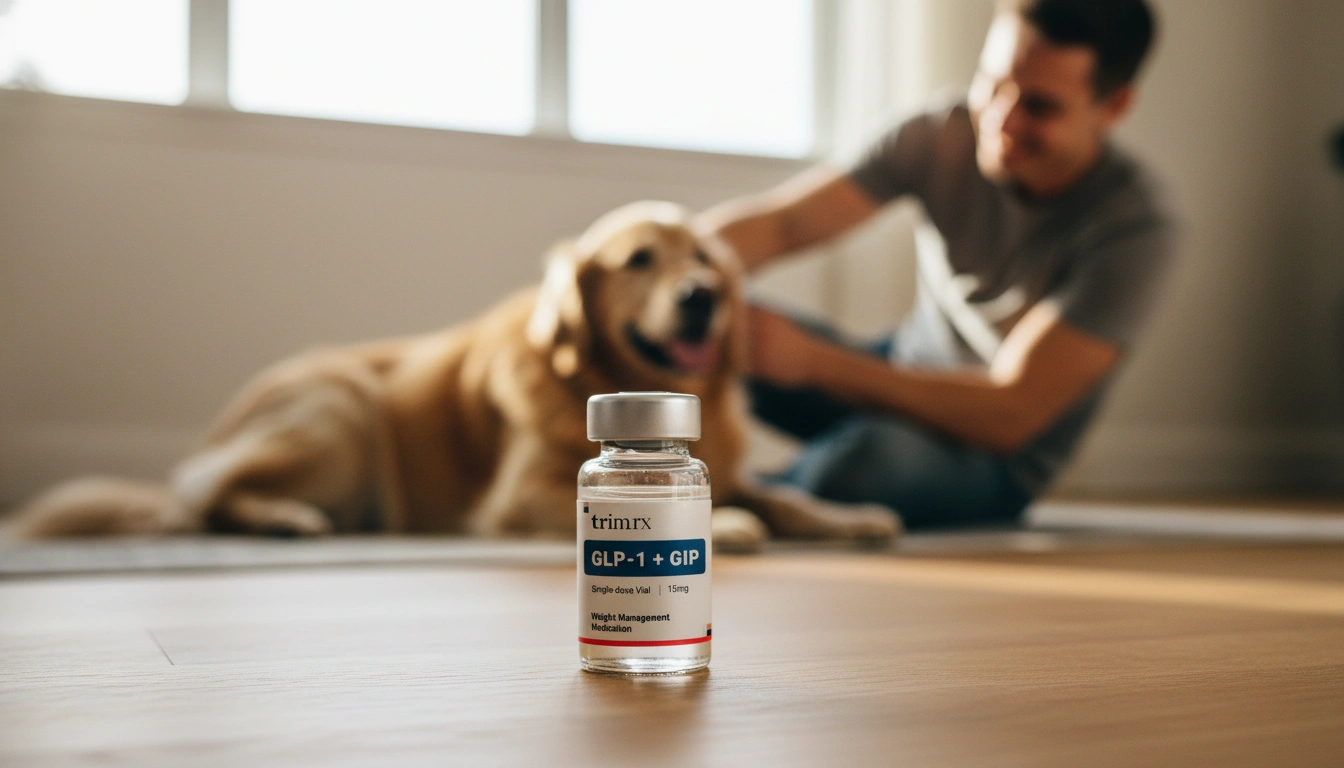Can I Take GLP-1? Exploring the Benefits and Considerations of GLP-1 Agonists

Introduction
Did you know that more than 70% of adults in the U.S. are classified as either overweight or obese? This staggering statistic underscores the urgency of effective weight management strategies. As a response to this growing health concern, GLP-1 receptor agonists have emerged as a promising option, not just for those managing type 2 diabetes but also for individuals striving to achieve sustainable weight loss.
GLP-1, or glucagon-like peptide-1, is a hormone naturally produced in the intestine in response to food intake. This hormone plays several crucial roles in regulating appetite, enhancing insulin secretion, and slowing gastric emptying. By mimicking the action of GLP-1, GLP-1 receptor agonists can effectively help individuals manage their blood sugar levels and support weight loss efforts.
In this blog post, we will delve into the workings of GLP-1 medications, their benefits and side effects, and whether they might be the right choice for you. We will also highlight TrimRx’s commitment to personalized, medically supervised weight loss solutions that leverage cutting-edge technology and empathetic care. By the end of this article, you will have a clearer understanding of GLP-1s and whether they fit your health journey.
When it comes to managing weight and blood sugar levels, many individuals are seeking effective and sustainable solutions. One of the most talked-about advancements in this area is the use of GLP-1 receptor agonists, a class of medications that have garnered attention for their potential benefits in treating obesity and type 2 diabetes. But the question arises: can I take GLP-1? This article aims to provide a comprehensive overview of GLP-1 medications, their mechanisms of action, and the considerations to keep in mind when exploring these treatment options.
Understanding GLP-1 Agonists
What Are GLP-1 Agonists?
GLP-1 receptor agonists are a class of medications designed to mimic the effects of the naturally occurring GLP-1 hormone. They are primarily used for two main purposes: managing blood sugar levels in individuals with type 2 diabetes and promoting weight loss in people who are obese or overweight. The following are some key medications in this class:
- Semaglutide: Available as both an injection (Ozempic) and an oral tablet (Rybelsus), semaglutide has been shown to lower blood sugar levels and support weight loss.
- Liraglutide: This medication is available as an injection (Victoza for diabetes, Saxenda for weight loss) and works similarly to promote satiety and insulin release.
- Dulaglutide (Trulicity): Administered weekly, this injectable medication is effective in controlling blood sugar and facilitating weight loss.
- Tirzepatide (Mounjaro): This newer medication acts on both GLP-1 and GIP receptors, showing promise in enhancing weight loss and improving glycemic control.
How Do GLP-1 Agonists Work?
GLP-1 agonists function through several mechanisms that contribute to their effectiveness:
- Stimulating Insulin Release: They enhance the secretion of insulin from the pancreas in response to elevated blood sugar levels.
- Reducing Glucagon Secretion: GLP-1 receptor agonists inhibit glucagon, a hormone that raises blood sugar levels, helping to maintain better overall glucose control.
- Slowing Gastric Emptying: By delaying the emptying of the stomach, these medications help individuals feel fuller for longer, reducing overall food intake.
- Promoting Satiety: They influence brain receptors involved in appetite regulation, leading to reduced hunger and food cravings.
These combined effects not only help regulate blood sugar but also contribute to weight loss, making GLP-1 agonists a vital tool in both diabetes management and obesity treatment.
Who Can Benefit from GLP-1 Agonists?
GLP-1 agonists are typically recommended for individuals with:
- Type 2 Diabetes: Those who have difficulty managing their blood sugar levels with lifestyle changes or other medications.
- Obesity or Overweight: Individuals with a body mass index (BMI) of 30 or higher, or those with a BMI of 27 or higher who also have weight-related health issues.
However, it’s essential to consult with a healthcare provider to determine if GLP-1 treatment aligns with your specific health needs and goals.
Considering GLP-1 Agonists: Benefits and Risks
Benefits of GLP-1 Agonists
The use of GLP-1 agonists offers several advantages:
- Weight Loss: Clinical studies have shown that individuals using GLP-1 medications often experience significant weight loss, which can lead to improved overall health and reduced risk of obesity-related conditions.
- Improved Glycemic Control: These medications can help lower A1C levels, a key marker of long-term blood sugar control.
- Cardiovascular Benefits: Some GLP-1 agonists have demonstrated the ability to reduce the risk of major cardiovascular events, such as heart attacks and strokes, particularly in individuals with type 2 diabetes.
- Convenient Dosing: Many GLP-1 medications are available as once-weekly injections or daily oral tablets, making them easier to integrate into daily routines.
Potential Side Effects
While GLP-1 agonists are generally well-tolerated, some individuals may experience side effects, particularly when starting treatment or increasing the dose. Common side effects include:
- Gastrointestinal Issues: Nausea, vomiting, diarrhea, and constipation are among the most frequently reported side effects. These symptoms often improve over time as the body adjusts to the medication.
- Injection Site Reactions: Redness or irritation at the injection site may occur.
- Hypoglycemia: Although less common, low blood sugar levels can result, especially if combined with other diabetes medications.
- Pancreatitis: There is a potential risk of pancreatitis, a serious condition that requires immediate medical attention if symptoms arise, such as severe abdominal pain.
It’s crucial to discuss any concerns or pre-existing conditions with a healthcare provider to ensure that GLP-1 treatment is safe and appropriate for you.
The Role of TrimRx in Personalized Weight Management
At TrimRx, our mission is to empower individuals on their weight loss journeys through personalized, medically supervised care. We understand that each person’s experience with weight loss is unique, which is why we offer tailored treatment plans designed to fit individual needs.
Personalized Assessment Quiz
To determine eligibility for our prescription weight loss medications, we encourage you to take our free assessment quiz. This quiz helps us understand your health history and weight loss goals, allowing us to develop a personalized treatment plan that includes medications like compounded Semaglutide, Ozempic, or Tirzepatide.
Take our free assessment quiz here!
Comprehensive Service Offerings
TrimRx provides a robust suite of services, including:
- Doctor Consultations: Our qualified healthcare providers offer compassionate care and guidance throughout your weight loss journey.
- Medication Management: We partner with FDA-registered pharmacies to ensure that you receive high-quality GLP-1 medications safely.
- Lab Work and Monitoring: Regular lab tests help us monitor your progress and adjust treatment as needed.
- Unlimited Support: We provide ongoing support to help you stay motivated and accountable as you work toward your goals.
In addition to our prescription medications, we also offer quick-access supplements to support your weight loss journey. Our GLP-1 Daily Support and Weight Loss Boost supplements can provide additional support during your weight loss journey.
FAQ
Can I take GLP-1 agonists if I am not diabetic?
Yes, GLP-1 agonists are prescribed for individuals who are overweight or obese, even if they do not have diabetes. These medications can help promote weight loss and improve overall health.
How long does it take for GLP-1 agonists to work?
The timeline for experiencing the benefits of GLP-1 medications can vary by individual and medication type. Some may notice improvements in appetite and weight loss within a few weeks, while others may take longer.
Are there any dietary restrictions while taking GLP-1 medications?
While no specific dietary restrictions are mandated, adopting a balanced diet rich in whole foods can enhance the effectiveness of GLP-1 medications and support weight loss goals.
What should I do if I experience side effects from GLP-1 medications?
If you experience side effects, it’s essential to communicate with your healthcare provider. They can help manage symptoms and determine if a dosage adjustment or alternative treatment is necessary.
How can I find out if GLP-1 medications are right for me?
The best way to determine if GLP-1 medications are suitable for you is to speak with a healthcare provider who can evaluate your health history and weight loss goals. Completing our free assessment quiz is an excellent starting point.
Conclusion
GLP-1 receptor agonists represent a significant advancement in the management of obesity and type 2 diabetes. By mimicking the actions of natural hormones, these medications not only help regulate blood sugar levels but also promote weight loss, offering a multifaceted approach to improving health. At TrimRx, we are dedicated to providing personalized, empathetic care that supports individuals on their weight loss journeys.
If you’re considering whether you can take GLP-1, we encourage you to take our free assessment quiz to see if our personalized weight loss programs may be the right fit for your needs. With the right support, your path to a healthier lifestyle is within reach.
Together, we can explore the possibilities of GLP-1 medications and find the best strategies to support your unique health journey.

Transforming Lives, One Step at a Time
Keep reading
China’s Supreme Court Upholds Semaglutide Patent for Novo Nordisk
China’s Supreme People’s Court upholds Novo Nordisk’s semaglutide compound patent, supporting IP protection.
Over 600,000 Californians Risk Losing Access to GLP-1 Weight-Loss Drugs
California’s Medi-Cal will stop covering GLP-1 weight-loss drugs for weight-loss-only prescriptions, effective Jan. 1, 2026.
Weight-Loss Pill Approval Likely to Prompt Overhaul of Packaged Food and Fast-Food Products
FDA approval of GLP-1 weight-loss pills may prompt food makers and restaurants to shift to high-protein, smaller-portion products.



